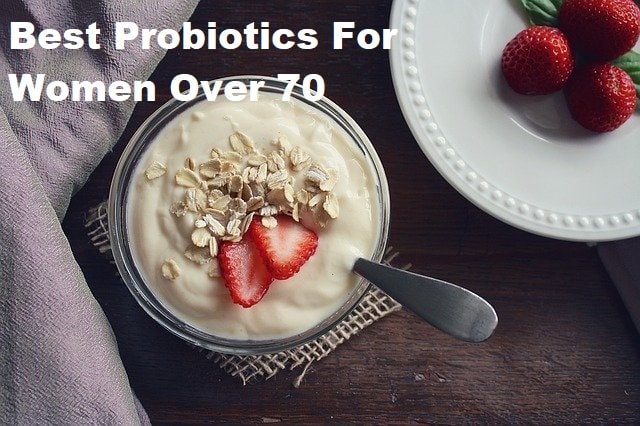Welcome friend! In this article, you will learn about the best probiotics for women over 70. Your biome is very important for your health so I hope you keep reading.
We have known for a long time already that our digestive tract is filled with microbes. But it wasn’t that long ago that they were just thought of as just passive parasites keeping away more hostile parasites by taking up living space.
But they have turned out to be much more than that. The advances in research over the past few decades have just begun to show the importance of the microbiome for our health and entire existence.
The microbes living in your intestine are an important part of your immune system, digestion, metabolism and they even seem to affect your cognition and mental health.
The amazing fact that your body has more DNA from the microbes in your gut than from your cells just goes to show how important these single-cell organisms are for us.
Considering that, it’s no wonder that probiotics – supplements containing living gut bacteria – have become some of the most popular supplements.
They’ve been touted to help everything from digestive issues to immunity and to even help with menopause.
But the truth is that not all probiotic supplements are created equal and most of them will only offer short-lived effects if any at all, with a hefty price tag.
So should you use probiotics as a woman over 70? Let’s find out.
What Is The Microbiome
Before we talk about probiotics, it’s important to understand what the human microbiome is.
The human microbiome refers to the billions of bacteria and other microbes colonizing your whole body. It’s more often used to refer to the ones in your digestive tract, however.
You probably already know that there are beneficial bacteria in your gut bt what might come as a surprise is that virtually your whole body is habited by microorganisms.
In fact, there is vastly more microbe DNA on your body than there is human DNA because there are more microbes in and on your body than there are cells.
Considering this fact it’s not hard to understand that we live in symbiosis with these beneficial organisms and that they have a critical role in our overall health and functioning.
Most of the microbiome is located in your colon and the small intestine. The stomach is too acidic for most bacteria to survive but even there are some microbes.
Everyone’s microbiome is different so it’s as individual as a fingerprint and it’s mainly formed in your youth. We’ll talk more about that in the next chapter.
Your microbiome has a very important function in your immunity and metabolism and recent studies show that it likely even affects your mood and cognition.
The microbiome improves your immunity by preventing harmful bacteria and viruses from growing through complex immunological processes.
One of the most important functions for these microbes is to metabolize foods that can’t be digested by your body. This improves energy uptake and produces beneficial nutrients.
The microbiome is robust and something you usually never think about – until something goes wrong. Typically issues with the microbiome are associated with long and hard courses of antibiotics or conditions that cause immunodeficiency.
Let’s look at the things that affect your individual microbiome.
Things That Affect The Microbiome
The most important factor for your microbiome is your early childhood, especially birth. You see, most people will inherit or acquire the basic microbiome from their mother during childbirth.
If you are born through a c-section, this important exposure to your mother’s microbiome can be insufficient.
This can result in all sorts of digestive and immunological issues, as your microbiome will be formed through exposure to the environment.
Fortunately, the latest research shows that this difference will likely be only intermittent as long as the infant is exposed to the microbiome from breast milk.
Which is the next important source of exposure from the mother. But naturally, the microbes in the breast milk (and the skin) will not be as diverse as the microbes of the birth canal.
This is why it’s now a standard procedure to expose babies born through c-section to the secretions of the mother to ensure proper microbe exposure.
After birth and breastfeeding your childhood home and family will determine the rest of your microbiome. You will get bacteria from your parents, siblings, parts, and domestic animals as well as nature.
Generally speaking, diversity is better. Children that grew up at farms usually have less allergies, immune deficiencies, etc. partly due to a more diverse microbiome. So being overly hygienic around your children might actually be counterproductive.
For that reason, it probably doesn’t come as a surprise that antibiotics also play a big role in your microbiome, especially during childhood.
Antibiotics kill all kinds of microbes, they don’t make a distinction between beneficial ones and pathogens. So each course will weaken your microbiome.
Finally, as an adult, your diet will have the biggest effect on your microbiome. Someone eating mainly processed food, sugar, and lots of meat will likely have larger populations of different bacteria than someone who eats mainly fresh vegetables for example.
Age and sex can also have an effect on your microbiome but they likely play a much lower role.
What Are Probiotics
Probiotics are foods or supplements that contain live beneficial bacteria that can at least, in theory, colonize your gut. Probiotics can also contain other microbes besides, most commonly yeasts.
Most commonly when people talk about probiotics, they are referring to probiotic supplements, which can be bought in pharmacies, health stores, and more commonly these days in grocery stores.
But it’s important to recognize that food can also be probiotic and will in fact likely have a greater effect on your microbiome than using supplements.
Not only can food contain beneficial bacteria, but the type of foods you eat will also dictate what kind of microbes will thrive in your gut. This is because your food is also their food and different strains of bacteria thrive with different foods.
Generally speaking, a diet that contains a lot of fiber, long-chain carbohydrates, healthy fats, and lean proteins will be beneficial for the microbiome compared to diets containing high amounts of simple carbs and sugar, low fiber, and lots of saturated fat and animal protein.
A food that is beneficial for the growth of your biome but doesn’t contain live bacteria is called prebiotic. Foods that are actually probiotic include all kinds of fermented foods like yogurt, sauerkraut, kombucha, miso, pickles, etc.
Probiotic supplements often contain single or multiple researched bacteria strain in millions or billions per pill.
The idea is to offer a massive amount of known healthy bacteria to the gut in an attempt to colonize them in your intestine or at least offer transient health effects.
But are they really effective?
Are Probiotics Effective
When the research on the importance of the microbiome started to become clear there was a lot of hope and hype for the beneficial potential of probiotic supplements.
Unfortunately, it has turned out that most probiotic supplements are not that effective in modifying your individual microbiome and have even been claimed quite useless.
But there are certain conditions when they can be beneficial and at least help with disease symptoms.
One of the best-known uses is for diarrhea prevention during antibiotic use. Probiotics have been
That said it has turned out that modifying your diet can actually have a much greater effect on the microbiome, especially in the long run.
It’s even likely that some of the positive health effects of a healthy diet are due to the changes in your microbiome.
This takes us to the best probiotics for women over 70.
Best Probiotics For Women Over 70
The truth is that there is likely no best probiotic for a specific group like women over 70. The diversity between individuals is likely much higher than between sexes and different age groups.
That’s why I’m not going to recommend some arbitrary probiotic that is marketed for senior women.
That said, if you are absolutely set on using a probiotic supplement, I recommend you buy one that is from an established brand and preferably refrigerated.
Most probiotics simply have too little bacteria or they are not well preserved. You can look at the article Best Probiotics for Seniors for ideas.
Now that said, I do recommend you establish a diet that is beneficial for your microbiome as it’s likely for your overall health as well.
Any healthy diet that consists mainly of whole foods, lot’s of vegetables and only modest amounts of animal protein and fats is likely beneficial for your microbiome.
The Mediterranean diet is a typical option for this. To get beneficial bacteria, I recommend you include some form of fermented food in your diet every day.
Yogurts with live cultures are a great option as well as real fermented pickles.
There is some evidence that lack of exercise and stress can also play a role in your microbiome so it’s important to get diverse exercise and reduce stress as well.
My recommendation is to combine strength training and activities you enjoy like Yoga, kayaking, Tai Chi, jogging etc.
Conclusion
I hope you found this post useful and it gave you some ideas for the best sources of healthy microbes for senior women.
If you have any questions, feel free to leave them in the comments section below and I will get back to you.
As a recap, the microbiome is very important for your health but it’s mostly affected by your diet as an adult. Probiotics unfortunately have turned out to be likely ineffective and can even be harmful in some situations.
That’s why I recommend you save your money on probiotic supplements and focus on a healthy and diverse diet that includes fermented foods.
Thanks for reading and see you next time!


I am 87 woman who has a lot of constipation problems and have been taking Garden of Life 50 billion /dr /formulated. //would the 85 billion raw probiotics be
better. An does it have to be refrigerated
Sorry to hear about your constipation problems Shirley. There is some evidence that probiotics can help with constipation but they are actually more used to treat diarrhea. The problem with probiotics is that they are very rarely a fit-for-all solution. This is because the microbiome varies a lot between people. So something that works for me might not work for you. Constipation is also often caused by other issues besides microbiome imbalances. Dehydration, unsuitable diet, lack of exercise and different kinds of bowel function disorders (hormonal, neurological, structural etc.). The best supplements I have found for constipation are magnesium and psyllium husks. As always, run them by your doctor to rule out any contraindications. You can read more about constipation remedies here (copy it to your browser address bar, I’ve disabled direct links in comments): https://elderstrength.com/constipation-remedies-for-seniors/